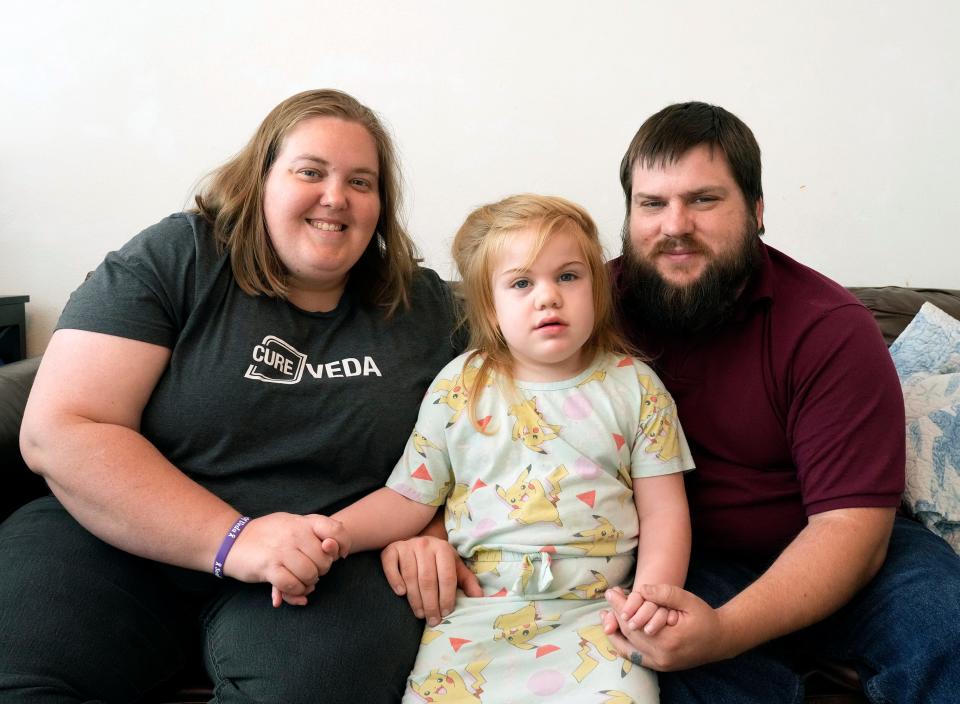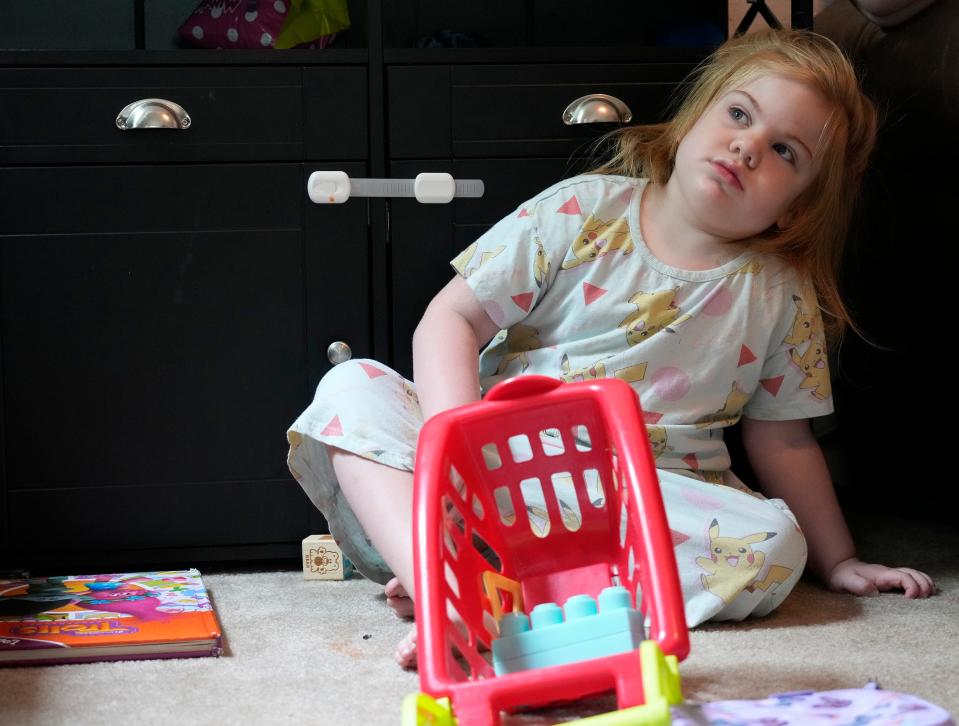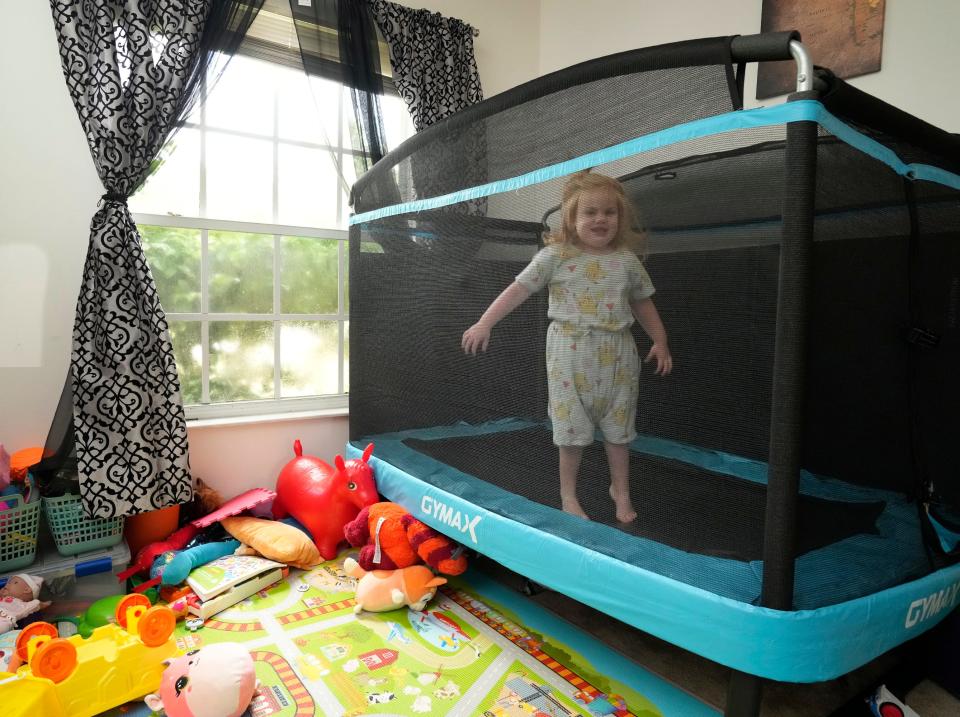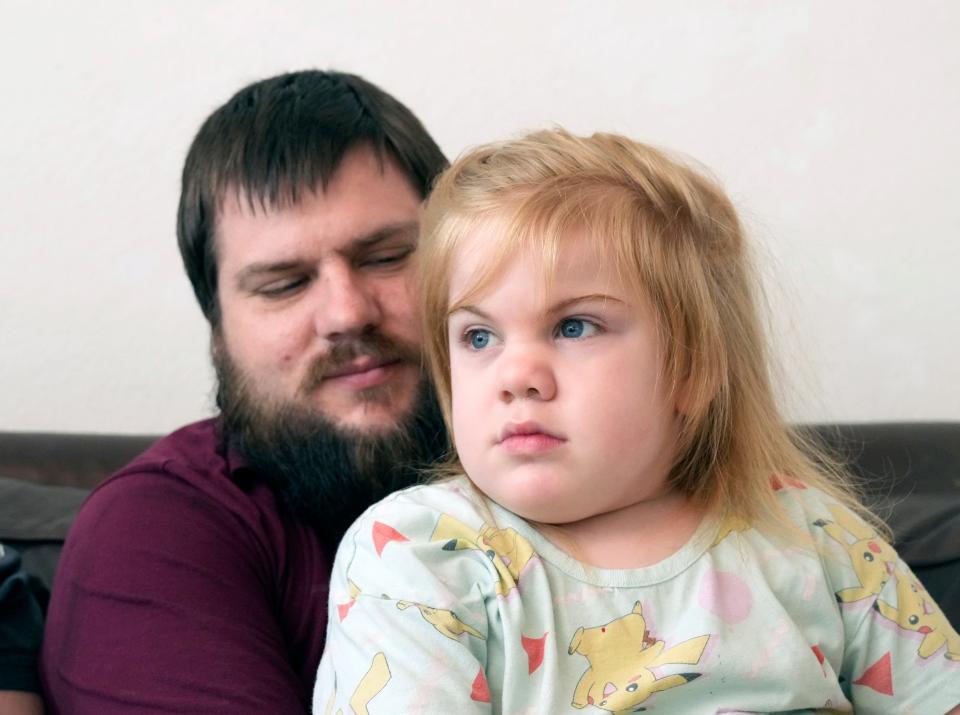For Palm Coast mom, a TikTok video led to diagnosis of daughter's rare disease
PALM COAST — As the U.S. House of Representatives passed a bill earlier this month that could result in a ban of the wildly popular social media site TikTok in the United States, a Flagler County family battling for their daughter’s life against a rare fatal disease is thankful for its existence.
“Without it, we could still be looking for answers,” said Christin Ulrich, whose 4-year-old daughter Veda is fighting against Sanfilippo Syndrome, a terminal, neurodegenerative condition that causes children to lose the capability to speak, to suffer seizures and movement disorders that include the ability to eat.
Known as “childhood Alzheimer’s,” it typically results in death by the teen years.
For Christin Ulrich and her husband, Jericho, the search for answers about their daughter’s health problems started a little over two years ago, when Veda’s speech skills began to decline and she was plagued with constant respiratory and inner-ear infections.

“Doctors couldn’t really tell us what was going on with her,” Christin said.
At that point, Veda also started displaying aggressive, hyperactive behavior that seemingly pointed to an autism diagnosis. At the same time, however, she also started to have new issues with stumbling, so much so that she could no longer climb playground stairs that she had once traveled with ease.
For mom, TikTok video 'hit me like a punch'
For the Ulrichs, the answer arrived from an unlikely source one night nearly two years ago.
As Christin was in bed, scrolling through TikTok videos, she spotted a little girl that looked so much like her daughter that “she could’ve been Veda’s twin,” she said. The little girl’s mother, Carrie Fowler, was talking in Georgia about the family’s fight against Sanfilippo Syndrome, describing symptoms that mirrored what Veda had been experiencing.
“The realization Sanfilippo Syndrome could be the reason for all Veda’s symptoms hit me like a punch,” Christin said. After a series of tests, the diagnosis was confirmed two months later, in September 2022.

Through TikTok, the two families have become close friends, meeting for real-life visits at Fowler’s home, going through experiences that can’t be shared in the same way with others, Christin said.
In case you missed it: Mark Lane: A tale of two social media crackdowns
“It means everything,” she said of relationships with others coping with the disease. “They’re the only people who really get it. Friends and family can say they’re sorry, but they don’t understand like these other people (battling the disease) do.”
As disease progresses, 'time is of the essence'
What Christin and Jericho Ulrich understand is that their daughter is battling the clock every day against an unrelenting disease.
“Time is of the essence,” said Christin, 35, as her daughter brushes her blonde pigtails against her mother’s arm on the sofa in the family’s toy-laden living room. “Every day, she is losing something.”
Children with Sanfilippo Syndrome are born with a single genetic defect, a single change in their DNA, that causes their bodies to lack a necessary enzyme.
Without it, their bodies are unable to breakdown heparan sulfate, a natural cellular waste. That causes their bodies, particularly the brain, to become clogged at toxic levels that cause a cascade of detrimental effects and, ultimately, death.
It is estimated that Sanfilippo Syndrome affects 1 in every 70,000 births, according to the Cure Sanfilippo Foundation, a national organization based in Columbia, South Carolina, devoted to supporting research on the disease and families that are facing it.

Sanfilippo is classified as a rare disease because it affects fewer than 200,000 patients in the United States, a threshold established in 1983.
In Veda’s case, her vocabulary has shrunk by roughly 25% over the past year, according to her parents.
“We expect in the next year or so for her to lose her speech completely,” said Christin, who works as a hospital ultrasound technician.
Looking ahead, the grim expectations are that Veda could lose the ability to walk within the next three years, followed by the loss of swallowing ability as soon as a year after that, leading to the use of a feeding tube to eat.
At the moment, however, Veda still explores the books and toys around her with obvious happiness, making it harder to imagine the changes that could be coming.
“She is happy,” said Christin. “I call her my firecracker. One of the things we can be grateful for is that she doesn’t know she’s sick. She doesn’t know it’s going to take anything from her.”
Unfortunately, her parents aren’t blessed with that innocence.
“It was nice for us to get an answer,” Christin said of the day Veda was diagnosed, “but it felt like they told us our child died on the day we got her diagnosis. We grieve her every day, what could've been, what should’ve been.”
Even happy family outings to the beach with Veda and her 11-year-old sister, Elise, are framed by the realities of the illness.
“We can never have a great day,” Christin said. “There’s always a black cloud over it. When we watch her playing, there’s always the thought, ‘Who knows if next year she’ll be able to run on the beach?’”
Beyond that, the prospect of losing their daughter in her teens also looms.
On her left arm, Christin has tattooed the lyrics to a favorite Bette Midler song, “Baby Mine,” in the spot where she cradles her daughter to sing it as a bedtime lullaby:
“Rest your head, close to my heart/ Never to part, baby of mine”
Brushing away tears, Christin explains: “I got that to keep her with me, whenever she’s gone.”
Hope for recovery requires funds
The only hope for Veda, at the moment, is that she will be accepted in a rarely offered gene therapy trial, a process that requires a $500,000 investment from the family.
“There’s no insurance help, no federal funding, all the funding is done by the parents,” Christin said. “That doesn’t guarantee her a spot, but without the funding, the trial doesn’t happen.”
The family has launched a “Saving Veda” GoFundMe campaign online at savingveda.com that has raised more than $30,000 toward its $500,000 goal.

In addition, members of Volusia-Flagler Jeep clubs will be participating in a Jeep parade on Saturday, March 23, through the family’s Palm Coast neighborhood to raise awareness and funds.
A $500 donation from the nonprofit Jeep Beach Inc. also has been made to the Cure Sanfilippo Foundation, said Charlie Brown, director of photography for the annual Jeep Beach gatherings in Daytona Beach.
Brown and his wife were inspired to help the family after watching a video about their plight on Veda’s GoFundMe page, he said.
There’s also a benefit golf tournament slated for June 22 at The Club At Venetian Bay in New Smyrna Beach, the Ulrichs said.
The challenges facing the Ulrich family are mirrored by some 150 other families that have reached out to the Cure Sanfilippo Foundation, said Glenn O’Neill, the organization’s founder and president.
“The biggest question we get is ‘Can my child get access to a treatment that can better their lives and our family’s life?’” said O’Neill, whose 14-year-old daughter is battling the disease. “It’s a hard question to answer.”
Clinical trials that the families are seeking are extremely rare and enormously expensive, he said.
“These are generally small biotechs with very limited budgets and these trials often have between 10 and 20 kids. The options for these patents are so, so limited. They also just need family support. The day-to-day 24/7 of caring for a child as they are going backwards is horrendous on the parents.”
In their living room, Christin and Jericho Ulrich can attest to the anxiety.
“We have to take turns crying,” Christin said, looking at the emotional tattoo on her arm. “Yesterday was his, today is probably mine.”
This article originally appeared on The Daytona Beach News-Journal: TikTok video led to diagnosis of Palm Coast girl's rare disease

